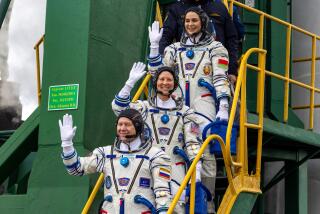Second Crew Will Make Journey to Mir to Help With Repairs
- Share via
MOSCOW — A second international crew of astronauts will fly to the damaged Russian space station Mir in August to try to repair the hole gouged in one of its six modules by an out-of-control cargo craft in an accident last month.
The crew already on board--American Michael Foale and Russians Vasily Tsibliyev and Alexander Lazutkin--plan to carry out initial repairs on July 17 and 18 that are expected to restore full solar power to the station.
A Russian Space Agency spokesman told the official Itar-Tass news agency Friday that the trio will be joined Aug. 5 by French astronaut Leopold Eyharts and Russians Anatoly Solovev and Pavel Vinogradov. The two Russian newcomers will then attempt the next stage of repairs.
Solovev and Vinogradov are practicing techniques for plugging the hole in the Spektr module, the spokesman said, using a replica of Mir in a huge water pool at Russia’s space training center.
Several ways of sealing the hole are being rehearsed, since its exact size is still not clear. Officials were not available Friday to give more details on the second stage of repairs.
Mir lost half its solar power in the June 25 collision, the worst accident in the station’s 11-year history.
After being hit by the unmanned supply craft during a docking rehearsal, the Spektr module where Foale slept and carried out experiments was punctured. It had to be sealed off from the rest of Mir to prevent the whole station from depressurizing.
Electric cables connecting the station’s most modern energy-generating solar panels, which are outside Spektr, ran through the module’s hatch. They were hastily cut, leaving the astronauts with only the bare minimum of electricity.
NASA spokeswoman Kathleen Maliga said the three men on Mir installed new communications equipment Friday. Today, she said, they will continue planning their repair operation and then will try to rest.
Mir is the world’s only existing manned space station. It provides a crucial training center for the planned international space station Alpha, expected to go into operation in 1999.
More to Read
Sign up for Essential California
The most important California stories and recommendations in your inbox every morning.
You may occasionally receive promotional content from the Los Angeles Times.













